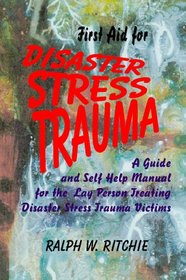Search -
First Aid for Disaster Stress Trauma Victims: A Guide and Self-Help Manual for the Lay-Person Treating Disaster Stress Trauma Victims
First Aid for Disaster Stress Trauma Victims A Guide and SelfHelp Manual for the LayPerson Treating Disaster Stress Trauma Victims
Author:
This book tells a story about a typical family, neighborhood, and community, during and after a disaster, how they react, and what help they need. Their reactions change with time and so must the treatment. The object of the book is to provide anyone with the means to understand, cope, and help victims rebuild lives that may have been ... more »
Author:
This book tells a story about a typical family, neighborhood, and community, during and after a disaster, how they react, and what help they need. Their reactions change with time and so must the treatment. The object of the book is to provide anyone with the means to understand, cope, and help victims rebuild lives that may have been ... more »
ISBN-13: 9780939656189
ISBN-10: 0939656183
Pages: 109
Edition: 1
Rating: ?
ISBN-10: 0939656183
Pages: 109
Edition: 1
Rating: ?
0 stars, based on 0 rating
Publisher: Ritchie Unlimited Publications
Book Type: Paperback
Members Wishing: 1
Reviews: Amazon | Write a Review
Book Type: Paperback
Members Wishing: 1
Reviews: Amazon | Write a Review
Genres:
- Business & Money >> Management & Leadership >> Decision-Making & Problem Solving
- Business & Money >> Management & Leadership >> Systems & Planning
- Business & Money >> Business Development & Entrepreneurship >> General
- Health, Fitness & Dieting >> Reference
- Science & Math >> Reference >> Medical >> General
- Medicine >> Reference >> General
- Medical Books >> Medicine >> Reference >> General




